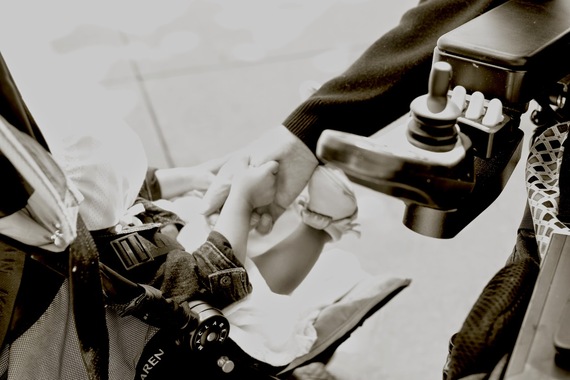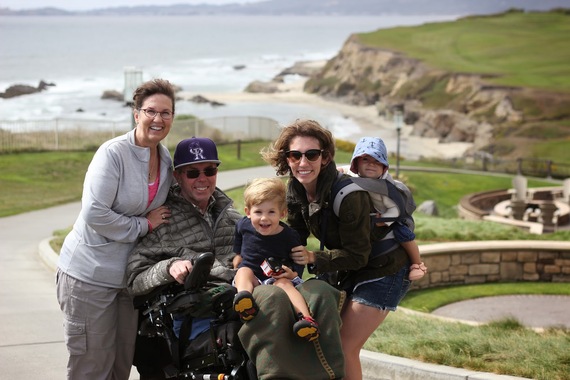I'm so thrilled to introduce you to my wonderful friend, Amanda Berns. Amanda is a caring mother to two small children. She's also a loving daughter to her wonderful father, David LeSueur. David is a kind and optimistic man who navigates the world in a wheelchair due to a Multiple Sclerosis diagnosis.
Amanda's children are 18 months and 2.5 years old. It probably comes as no surprise to you that Amanda spends most of her days pushing these two around the city in a stroller.
Upon reading the definitions for "wheelchair" and for "stroller," I started to feel like they weren't really all that different. They are both described as chairs on wheels, just intended for different people. Since I write about inclusion in retail and assistive devices, I thought it would be interesting to ask both Amanda and her dad, David, a series of questions. The exact same questions. Only when I posed them to Amanda, I used the word stroller. And with her father, I substituted wheelchair for stroller. My goal was to learn about what it's like to shop for these chairs on wheels.
What's it like to navigate the world with a chair on wheels?
Amanda (Stroller): It's not too bad. I go most places that I would like with two kids. There are a lot of places I can't get in or couldn't go to -- but honestly, I wouldn't want to bring my toddlers, anyway. Sometimes, it's awkward to go into places and feel like you are blocking everyone (because let's be honest -- you are). But I figure I have to run errands with my kids just like the rest of the world. So, I try to be kind and patient and not too annoying.
David (Wheelchair): When you're in a wheelchair, people don't talk to you generally. They treat you like you are a child. They talk to the person with you rather than talking to you. Like when walking into a restaurant to be seated, they ask the person with you how many are in the party. Or the check gets brought to someone else at the table instead of you. I can get in all public buildings, but going to people's houses is always tricky. I have to figure out beforehand if I can do it. I don't want to bother if it's not possible.
How many chairs on wheels have you owned?
Amanda (Stroller): I have owned... eight? I think? Way more than I should admit.
David (Wheelchair): I have owned two power chairs, one manual wheelchair and a scooter.
Why did you purchase separate ones?
Amanda (Stroller): I purchased separate ones to account for different needs. I had a jogging stroller, a get around town stroller and an umbrella stroller for traveling. And then we had our second kid, so I needed to get a double stroller. I also bought and sold a few strollers because I had changed my mind after using them. I had a jogging stroller with a fixed wheel for two weeks and changed my mind. I got really good at buying and selling them on Craigslist.
David (Wheelchair): I purchased separate ones because in each case, I became weaker and needed more features. My wheelchair had to adapt to my changing abilities.
Out of all of the responses, the thing I was most struck by was what they each had to say about options they had when shopping for their chair on wheels. Amanda's response gave me a very clear picture of who she is as a person and as a parent. David's response, on the other hand, left me having learned nothing about his personality and lifestyle. It felt a bit like Amanda was able to express herself through her purchases, but David was only able to express that he was simply a person who requires the assistance and support of a wheelchair.
Here's the thing: Amanda has bought and sold strollers on Craigslist. She has gone to run errands and has come home equipped with a new store-bought stroller. I'm sure she's received at least one stroller through a baby registry (which I am currently thinking of as insurance for the new mom). There is probably an entangled web of stroller hand-me-downs that weave her friends and family together. Amanda's stroller shopping narrative fits within the norm of any retail experience.
David (Wheelchair): Insurance pays for one wheelchair every five years. So, you try to think of things you may need over the next five-year period. Most people don't change in that period, but because of my MS, my needs have changed greatly over time. We have had to try to anticipate how my MS might progress. We relied heavily on the occupational therapist and the wheelchair salesmen, as we didn't know what questions to ask or what possibilities there were. We were disappointed that they didn't think of everything. In both cases, we have had to go back and slightly modify the wheelchair and what it came with.
Amanda, how long do you anticipate each of your children will rely on a stroller?
Amanda (Stroller): Until they are about 4 or so.
Is there anything you would change about your chair on wheels shopping experience?
Amanda (Stroller): Nah, it was easy. Pop into any baby store and Voila!
David (Wheelchair): Definitely. They are REALLY slow. From the time we start shopping to the time I actually get my chair takes four to six months. And there's not much of a reason for the delay. There's not much competition in the wheelchair business, so they don't have any reason to rush it.
My curiosity about the assistive device market can feel confusing at times. When I first started thinking about why there are so few options for people with disabilities, I thought it was because so few of us exist. In reality, our numbers are massive. In our lifetimes, one in two people will find themselves with a disability. At any given moment in time, one billion people on the planet will have a disability. For some of us the disability will be temporary and for others it will change our lives. But when I look at how motherhood has changed Amanda's life, it strikes me that her need for a stroller is so temporary. Society doesn't say, "Oh it's just a year, she'll make do." Retail doesn't quantify her need in the way it does with her dad.
A few years ago, the U.S. Department of Commerce published a study that stated two-thirds of the leading assistive device manufacturers were "passive in their pursuit of new ideas -- or not interested at all." This means that the companies who make products for people with disabilities do not invest in the research and development of new products.
At its very core, design is simply problem solving. The reality of design in retail environments is actually much different. In retail, the solution isn't the end of the story. Just as there are seasons of the year, fashion is also seasonal. And as we evolve, so too do our styles. This is true in every form of design, with one glaring exception... when the product is made for a person with a disability. Products for disabled people do not evolve. They do not change. Products for disabled people embody the concept of design at its very core. They simply solve the most basic and fundamental need. There is no need to improve upon the initial solution. There is no thought given to one's self expression or lifestyle.
It is my dream to change this. I don't believe that I have the best idea in the world. I just have one of the only ideas out there. I'd love for you to check it out. To feel amused for about 30 seconds and then that moment it occurs to you that my point is absolutely valid, to sign it.
Amanda deserves a lifetime of joy and ease. Amanda deserves to express herself in any way she sees fit. And so does her dad. Where is the wheelchair that invites David to be looked at. That grants him the validity to say he'll take the check. Some of the stigma lies in our perceptions of those living with disabilities. But I also believe some of the stigma lies in the design of the products we're using.
I hope tonight you will give cheers to a new generation. A generation of beautiful and purposeful products for the ones who need them the most.
Thank you, Amanda and David.



